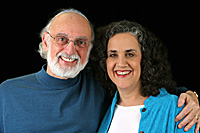By Manny Frishberg, JTNews Correspondent
What do parents want for their children? Success, of course. But at least in the West these days, most of all we want to raise happy, emotionally healthy individuals. Yet there are few roadmaps to follow. The vast majority of books on parenting have far more to say about discipline and raising cooperative kids than offering the keys to raising emotionally intelligent children.
That message, and some suggestions about what such a book might advise were part of what John Gottman told a sold-out crowd in the inaugural talk of this year’s Pathways lecture series. Gottman, a white-bearded emeritus professor of psychology at the University of Washington, with a self-effacing manner and a knit kippah covering his head, has been studying couples and family relationships for more than 30 years. He distilled much of what he and other family researchers have learned into a two-hour talk March 5 at Town Hall in Seattle. His talk was co-sponsored by ParentMap magazine, Temple B’nai Torah and Jewish Family Service, among others.
Until the 1970s, Gottman said, psychologists hardly studied emotions at all. The first thing they investigated was whether emotions are cross-cultural, or if they are different from one society to another. In fact, he said, emotions are universal — what makes people happy in Japan is much the same as in Borneo, France or in America. More recent studies that map the human brain show that most emotions are processed on the right side of the cerebral cortex, whereas language, and, interestingly, anger, are focused for most of us in the left side of the brain.
So, Gottman said, talking about feelings is key to integrating them and making them accessible to reason and understanding. This is important information, he said, since some people are deeply uncomfortable — meaning ill-at-ease, not just private or shy — when it comes to talking about emotions.
Based on that research and his own studies of children and families as they grew from 4 to 8 years old, he said that parents fall into two categories when it comes to how they deal with their children’s emotional predicaments.
“In general, we found there were two kinds of parents in terms of how they felt about emotions,” he said. “One type of family didn’t really like emotions and when [a child] felt sad, they’d say ‘Suck it up,’ and when their partner felt sad they’d say ‘Suck it up.’ They really didn’t notice low-intensity emotions.”
Where they did recognize strong emotions, he added, they tended to view them in a negative light. He said these people prefer that people display a positive outlook and that people in their family act cheerful most of the time. Some, he said, go so far as to punish their children for emotional displays.
The second type are what he refers to as “emotional coaches.” They tend to respond to their children’s emotional reactions by acknowledging them and then talking to them about why they feel the way they do, and how they react in similar circumstances, thereby validating the emotions and giving them room to sort out how to deal with them. He said these parents see those times as an opportunity to become closer to their children.
Dipping back into research on how children learn and fail, Gottman talked about the early years of the Head Start program, when it was assumed that early enrichment would help 4-year-olds from disadvantaged families perform better in school. He said that while researchers found that the pre-school programs, which highlight such things as counting and learning the alphabet, made a difference in early elementary grades, within two or three years, the children who did and did not go to Head Start were at about the same level. What they found was that the style of dealing with emotions was a much better predictor of future success in school, even when controlling for IQ scores.
Gottman added that research across the boards has shown that when people are criticized for poor performance in a task, they tend to score even worse on subsequent attempts.
“The emotion-dismissing parents give a lot of information, then wait until the kid makes a mistake and steps in to correct them,” Gottman said. “Emotion-coaching parents give them information, then step back and wait until they [do] something right,” and then praise them.
“When you point out someone’s mistakes, their performance goes down,” he said. “You can see from all these results that there is no such thing as constructive criticism.”
Although Gottman said that treating all emotions as valid is a good thing, he stopped short of endorsing permissiveness as a parenting approach.
“All feelings are acceptable, but not all behaviors are acceptable,” he said, adding that setting limits is an important part of parenting.
With his w ife, Julie Schwartz Gottman, Gottman is co-founder of the Gottman Institute, and is currently the executive director of the nonprofit Relationship Research Institute, which is looking at strategies to help expecting parents make the transition to parenthood.
